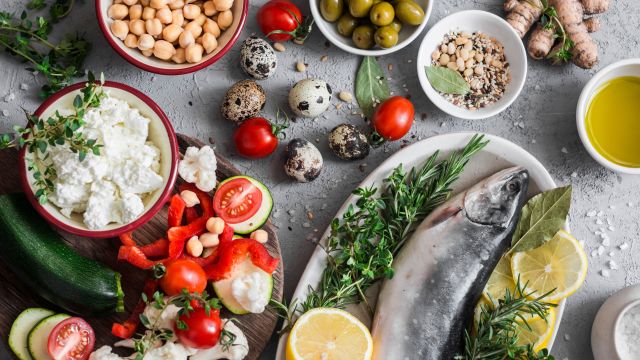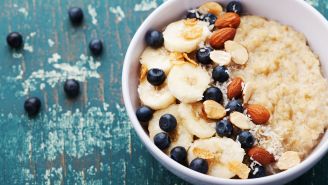Updated on June 6, 2022.
Weight loss is hard.
As we learned in the previous installments of our Science of Weight Loss series, just when you think you’re doing everything right—loading up on veggies, trimming down portion sizes, moving your body more—your metabolism and hormones can foil your best efforts.
It’s as if, despite your best efforts, the more weight you lose, the harder your body fights to put it back on.
But, as Darria Long Gillespie, MD and Keith W. Roach, MD, remind us, losing weight is still worth the effort. And it can be done if we focus on creating the conditions—both in our external environments and even within our own bodies—that foster success.
When people approach weight loss, it’s often from the perspective of restricting calories. Is it really a simple matter of mathematics?
Dr. Gillespie: It’s important to remember that when patients have drastic weight loss, and you're severely restricting calories, you trigger your body's starvation mechanism. So, your metabolism will slow as your body fights to hold on to those calories.
But it's not just calories-in, calories-out that impacts your metabolism. When you talk about weight gain and loss, the quality of your diet matters just as much.
You mean it matters what you eat just as it matters how much you eat?
Dr. Gillespie: That’s exactly right. But to understand how the food we eat impacts our metabolism, it’s important to first understand why our bodies evolved to conserve energy this way.
Thousands of years ago, humans had to gather or hunt for their food, which was predominantly plants with some lean meats. Fat, sugar, and salt were scarce, so people evolved to crave those things. Also, daily physical activity was the reality of their lives—so their bodies evolved to conserve energy output as much as possible.
Today, we live in a world where those imperatives are flipped 180 degrees.
These days, fat, sugar, and salt are ubiquitous and you actually have to work to find time for physical activity. So, the ways that our bodies evolved over a thousand years just don’t work in today’s obesity-promoting environment.
People who go on severe calorie-restricting diets might lose weight drastically. But they may emerge from such an environment with a drastically decreased metabolism and find themselves in the same obesity-promoting environment that caused the problem in the first place.
So it’s not just personal willpower working against you. You’ve also got to deal with an entire food and movement environment that exists around you?
Dr. Gillespie: It’s not that willpower is working against you, it’s just that no one’s willpower is strong enough to be the only tool they have in combatting weight gain in today’s world. But that doesn't mean weight loss is impossible.
Take the National Weight Control Registry (NWCR), for example. It’s a massive research project tracking more than 10,000 people, looking at the habits and practices those people follow to maintain long-term, sustained weight loss.
A big takeaway from the NWCR is that people who have succeeded at weight loss have managed to change their habits and their environment. That might include not keeping certain foods in their home—especially those that we evolved to crave and that derail our weight loss efforts, like sugary/salty/fatty snacks and comfort foods.
So you can make weight loss less difficult by making changes to your environment?
Dr. Gillespie: That’s right. The food environment and the food itself will make a big difference.
Dr. Roach: I want to emphasize what Dr. Gillespie said about the foods that are plentiful in our lives. Quantity matters and quality does, too. And when we’re talking about this, let's not let the food companies off the hook.
For the last 30, 40, 50 years, they've had a very robust scientific program to figure out what it is that makes us want to eat more. And the companies are rewarded for this by having better sales.
As health practitioners, we’re now in competition with companies that are saying to people, "Here's something that's great: Your body's gonna want to keep eating and eating even when you shouldn't have any more."
The book Salt Sugar Fat by Michael Moss does a great job describing the scientific process by which food companies have learned to manipulate the way that we eat and crave foods.
The upshot is if we can avoid those kinds of foods, it's going to make it a lot easier to maintain a healthier weight—even after weight loss and the drop in metabolism that comes with that.
Dr. Gillespie: I agree 100 percent.
I’m glad we came back to this, because to lose weight, it's not just about focusing on the calories, but on what you are taking in. If you are consistently eating foods that are calorie-rich but nutrient-vapid—like sugary snacks and drinks—those foods continually stimulate the reward areas of the brain, and you’re not going to be able to resist the next bite. To truly lose weight you have to break that habit.
By sugar, salt, and fat, we’re talking about stuff like processed, packaged snacks—cookies, cakes, chips, and the like. Knowing what to avoid helps, but what are the kinds of foods that can enhance weight loss, or at least make life easier when you're on that journey?
Dr. Roach: Fiber is a big part of it. Great sources of fiber are whole grains, vegetables, and legumes. Then nuts, which contain fiber and healthy fats, and high-quality protein sources like fish. That's why we see that people who are on a Mediterranean diet experience some weight loss, less diabetes, and less heart disease.
And I think we'd be remiss if we didn't at least touch on the fact that changes will happen at the microbiome level as people change their diet. In particular, we’re talking about changing from a typical Western diet—full of salt, sugar, fat—to a healthier diet like a Mediterranean diet or the diet that people ate a couple of hundred years ago that left out all of these processed foods.
There have been some interesting studies that have shown that if you transplant a microbiome from an obese person into a thin person, that thin person is more likely to gain weight.
You had me at Mediterranean… but lost me at “microbiome.”
Dr. Roach: The microbiome is the whole suite of microorganisms—healthy bacteria—that live in our intestines and that outnumber the cells in our own bodies. We can't live without these “good bugs” and they're necessary for us to digest food properly. They're even responsible for making some of the nutrients we depend on from the food we eat, including B vitamins and vitamin K and certain fatty acids.
We’re just beginning to realize how important these bacteria are to our health and how they can change with different diets.
If you're going to create a diet that fosters weight loss, you might want to look into some of the foods that your microbiome might enjoy eating as well?
Dr. Gillespie: That’s right.
The good thing is that the majority of foods that your gut bacteria like are those that make up the Mediterranean diet, including foods high in fiber.
We’re also talking about fermented foods—think pickles, kimchi, sauerkraut—and cultured milk products, like yogurt and kefir, that offer good bacteria, known as probiotics.
Most of the foods that are good for your general health are also good for your microbiome, which may affect your weight. We're also finding that a healthy microbiome may influence your overall health and mental health and may even have a role in allergies and other immune conditions.
So to eat right for yourself and for your friendly bacteria, you want to get plenty of fiber, healthy fats, lean protein, and some fermented foods, too, for probiotics.
Dr. Gillespie: All correct. And now getting down to the kitchen level, let’s not leave out the importance of paying attention to flavors in the food we eat.
There are four main flavors—or five, depending on the culinary tradition.
In Western society we tend to focus on salty and sweet, but in the process we forget the others. So the question is, can you add those other flavors to your palate—the sour, the bitter, the umami.
What’s that fifth flavor again?
Dr. Gillespie: That’s umami, often described as savory or meaty. Think sautéed mushrooms, Parmesan cheese, steak.
If you can take all five flavors and create new combinations with multi-dimensional flavors, you can turn healthier foods into delicious ones without having to rely on fat and salt and sugar to make things tasty.
What about building your diet around “fat-burning foods”—like hot peppers or avocados—that supposedly slim you down when you eat them?
Dr. Roach: I'm not a believer. I think it’s better to go for dietary diversity, rather than emphasizing certain foods. Because, one, it's more fun and can keep you interested and satisfied to eat a variety of things, and two, eating a range of foods gives you a complete set of nutrition.
Dr. Gillespie: I agree. And a lot of these so-called fat burning foods are just things with lots of fiber or lean protein that we already know are healthy. So it’s not like I’d avoid eating them, but like Dr. Roach said, I wouldn’t prioritize them over others, but rather fold them into a well-balanced, varied diet.
Do certain foods have different effects on the body? Say a snack of potato chips and Twinkies versus a quinoa bowl with salmon and asparagus?
Dr. Gillespie: Well, when you eat that quinoa-asparagus-salmon bowl, your glucose and insulin levels would be much more even.
Dr. Roach: And because of the spikes in insulin you’d get from the potato-chip/Twinkie diet, it's more likely you're going to eat more calories. And with the quinoa bowl, you’ll feel a whole lot better.
Quinoa-asparagus-salmon it is.
Dr. Roach: Just remember: “Your mileage may vary.” What works well for one person is not going to work well for somebody else. A diet that you might think would be wretched may help somebody else lose weight. It’s often trial and error to find something that you like, that you can maintain, and that's going to work for you.
Dr. Gillespie: True. When we look at the eating patterns that are associated with the greatest longevity—whether it's the Mediterranean diet, the Okinawan diet, or the Loma Linda diet—the same themes emerge. That’s large amounts of fiber and produce, lean protein, maybe a little bit of dairy, a little bit of red meat but very minimal amounts of processed foods and candy. That needs to be the cornerstone of whatever you choose.
And also remember, if you’re truly trying to lose weight, it’s a good idea to speak to healthcare provider or a registered dietitian to help you get started, particularly if you could use a hand making changes to your diet and lifestyle.
Darria Long Gillespie, MD, MBA, FACEP, is an emergency department physician and clinical assistant professor at the University of Tennessee Health Science Center.
Keith W. Roach, MD, FACP, is associate professor of clinical medicine at Weill Medical College of Cornell University in New York City and an associate attending physician at NewYork-Presbyterian Hospital. He is a co-creator of the RealAge Test.







